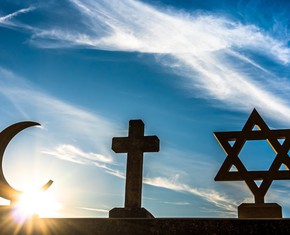The views expressed in our content reflect individual perspectives and do not represent the authoritative views of the Baha'i Faith.
All superior kingdoms are incomprehensible to the inferior; how therefore could it be possible that the creature, man, should understand the almighty Creator of all? – Abdu’l-Baha, Paris Talks, p. 25.
Do you believe in God?
Most of us do. Polls of people in almost every country estimate that at least 84% of the global population says they have an active belief in a Supreme Being. Only about 10-15% of poll respondents worldwide will actively say they don’t believe in God.
Even when people say that religion plays no part in their daily lives, or that they don’t practice any particular religion, most still say they believe in a Supreme Being.
In China, for example, polls show that 82% of the population reports that religion plays no part in their lives; but more than 80% say they have a belief in God.
 So if you do believe in God, what do you believe in?
So if you do believe in God, what do you believe in?
That’s the question we probably receive most often here at BahaiTeachings.org—what do Baha’is believe about God?
This short series of essays will attempt to answer that question.
But first I’ll start with a massive disclaimer, exemplified by the quote from the Baha’i teachings above: no human being can know, comprehend or understand the Supreme Being. Whatever I write is the product of my own limited and circumscribed mind; and it cannot, even for a moment, grasp the reality of its Creator.
A rock can’t understand a tree. A tree can’t understand a horse. A horse can’t understand a human being. Each one of the natural kingdoms—mineral, vegetable, animal, human and then the Divine—has the power to understand the levels below it, but not the levels above.
At a talk he gave in London, Abdu’l-Baha addressed this immutable law of nature:
O Seekers for the Kingdom of God! Man all over the world is seeking for God. All that exists is God; but the Reality of Divinity is holy above all understanding.
The pictures of Divinity that come to our mind are the product of our fancy; they exist in the realm of our imagination. They are not adequate to the Truth; truth in its essence cannot be put into words.
Divinity cannot be comprehended because it is comprehending.
Man, who has also a real existence, is comprehended by God; therefore, the Divinity which man can understand is partial; it is not complete. Divinity is actual Truth and real existence, and not any representation of it. Divinity itself contains All, and is not contained.
Although the mineral, vegetable, animal and man all have actual being, yet the mineral has no knowledge of the vegetable. It cannot apprehend it. It cannot imagine nor understand it.
It is the same with the vegetable. Any progress it may make, however highly it may become developed, it will never apprehend the animal, nor understand it. It is, so to speak, without news of it. It has no ears, no sight, no understanding.
It is the same with the animal. However much it may progress in its own kingdom, however refined its feelings may become, it will have no real notion of the world of man or of his special intellectual faculties.
The animal cannot understand the roundness of the earth, nor its motion in space, nor the central position of the sun, nor can it imagine such a thing as the all-pervading ether.
Although the mineral, vegetable, animal and man himself are actual beings, the difference between their kingdoms prevents members of the lower degree from comprehending the essence and nature of those of the superior degree. This being so, how can the temporal and phenomenal comprehend the Lord of Hosts? It is clear that this is impossible! – Abdu’l-Baha, Abdu’l-Baha in London, pp. 22-23.
With that in mind, let’s explore the vision of God the Baha’i teachings offer, and discover the mystical and the practical Baha’i approach to the most great mystery.
















Comments
Sign in or create an account
Continue with Googleor